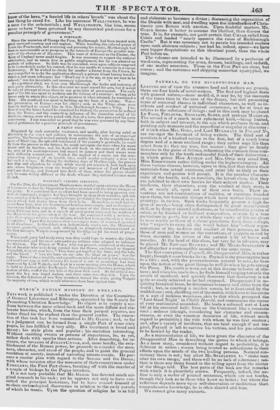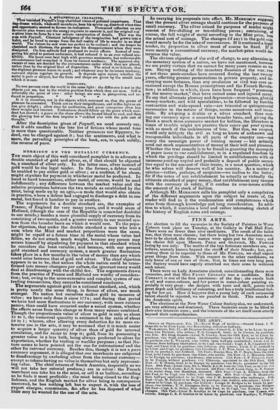PAYNELL, OR THE DISAPPOINTED MAN.
LEAVING out of view the common herd and authors sui zeneris, there are four kinds of novel-writers. The first and highest deals with general nature,—more modified, it may be, by the manners of the times than in the case of the drama, but still presenting types of universal classes in individual characters, as well as in- cidents and conduct of universal occurrence, so far at least as relates to the substance of things: and in this rank may be placed LE SAGE, FIELDING, SMOLLETT, SCOTT, and perhaps MARRYAT. The second is of a much more ephemeral kind,—being both in subject and interest, to the age which produces them, and painting only manners and the superficial or singular in character : of which class Mrs. GORE, and Lord MULGRAVE in YeR and No are amongst the foremost of living writers. The third sort of novelists is of a kindred nature to the first, but of a much lower degree and of a more confined range; they rather copy life than select from it ; they are true, but narrow ; they give us family histories in the guise of fictions, redeeming the common from com- monplace only by the truth and careful finish of their delineation : in which genus Miss Arm:sr and Mrs. OPIE may stand first, Miss EDGEWORTH rather falling under the highestcategory. All these various classes, however, agree in this, that they derive their materials from actual existence, and paint life as truly as their experience and genius will permit. It is the peculiar characte- ristic of the fourth, and, as novelists, the lowest class, that they are indebted to their own fancies for their subject matter. Their incidents, their characters, even the conduct of their story; is all, or nearly all, spun out of their own brain. Their in- ventions are not combinations of realities, or creations founded upon them, but fantastic things which have neither likeness nor prototype in nature. Such works frequently possess a high de- gree of molt,—hiring often distinguished by great metaphysical skill, or by deep or shrewd reflections, or by considerable pryers of satire, or by finished or brilliant composition, or even by a true portraiture in parts, but as a whole their views of life are about as near reality as those of a clever greenhorn fresh from cillege, who " expects to carry all the world before him"—their repre- sentations of the motives and conduct of their persons, as like those of men and women as the contortions of puppets nvived by wires resemble the action of the natural b Aly of bones and muscles. At the head of this class, but very far in advance, may be placed Mr. EDWARD I3CLWER ; and Mr. NIILEs STAPLETON is not altogether a contemptible member of the same corps.
The first conception of Paynell, the Disappointed Mute, is rather happy, though it soon breaks do an. Paynell is the presumptive heir to a title ; and, with the procrastination natural to man„ha lives upon the notion of the great things he will do when he gets among the Peers. His youth is worn out in this dreamy industry of idle- ness; and when his uncle dies, he finds himself verging towards the zenith of manhood, and quickly discovers that distinction is not quite so easily achieved as he had supposed. Disappointed in ac- quiring historical fame, he determines to marry and retire from the world ; but, in courting a maiden cousin, he is fascinated by the wedded one : and, shuffling out of the match, withdraws to his estate in a sort of reckless weariness, akin to that which prompted the " Last Good Night" in Childe Harold, and commences the career of your sentimental scoundrel. He leads a softened sort ot Lam life at his ancestral hall; lives on the Continent like a romantic roué ; seduces (though, considering her character and circum- stances, or even the common decencies of life, without much regard to probability) the wife with whom he was first smitten ; and, after a variety of incidents, that are fatal enough if' not tra- gical, Paynell is left to survive his victims, and his punishment to be fancied by the reader. As a representation of life, we have given the character of the Disappointed Man in describing the genus to which it belongs. As a mere story, considered without regard to probability, it is deficient in action ; events being treated as subordinate to their effects upon the minds of the two leading persons. Natural con- sistency there is not ; but allow Mr. STAPLETON to " make man after his own image," and there will be no lack of coherence; nei- ther is there any thing forced in the telling apart from the matter of the things told. The best parts of the book are the remarks with which it is plentifully strewn. Frequently, indeed, the au- thor is only a maker of pointed sentences, which are not truths, though they look so to those who know no better ; but where the reflection depends more upon self-observation or meditatiun than comprehensive knowledge, he is often shrewd and true.
We cannot give many extracts.
A METAPHYSICAL CHARACTER. 'Thus vanished PayneIrs long-cherished vision of political importance. That daydream which, whileatill in embryo, bore his spirits up,diesolved when time and opportunity seemed to favour its realization. Protracted reflection on any favourite plan wears out the energy requisite to execute it, and the original can cinion loses its force by a too minute examination of details. This was the ease with Paynell. Constant indulgence of the imagination had grown into a habit, and he loved to escape from the dull reality of life to wander in an ideal world. The visions he saw were too perfect to be realized ; and the longer he cherished such illusions, the greater was his disappointment when they were dissipated. On him solitude had produced its worst effects. Instead of tem- pering his mind to patient endurance, it had reduced it to an over refined sen- sibility. His heart once beat high with generous sentiments, but unfavourable circumstances had wrenched it from its natural tendency. The apparent cha- racters of men are decided by the circumstances under which they are placed, rather than by the original bent of disposition. The mind is so delicate, that the slightest pressure leaves its mark ; and whatever may be its innate tendency, outward objects regulate its growth. It depends upon nature whether the metal is pure or alloyed, but the form and shape are given by the mould into which it is cast.
THOUGHTS.
No two persons view the world in the same light : the difference is not in the objects you see, but in the relative position from which they are seen. Self is invariably the point of view : other beings are seen in perspective, and re- duced in proportion. • • • • i
It is in ourselves, not in the objects which surround us, that the germs of pleasure lie concealed. Think not on their insignificance, and trifles light as air can give delight ; allow time for meditation, and great enterprises often lose their weight and interest. Enthusiasm should follow up the game which acci- dent has started ; a pause in the chase allows the heated blood to cool, and then the glowing hue of the first impulse is " sicklied o'er with the pale cast of thought."
After the description given of Paynell, we need scarcely say, that it adds another to the late list of fictions whose moral tone is more than questionable. Neither grossness nor flippancy, in- deed, can be charged against it ; but the sentiments, and what is more, the pervading principles of the book, are, to speak mildly, the reverse of pure.



























 Previous page
Previous page